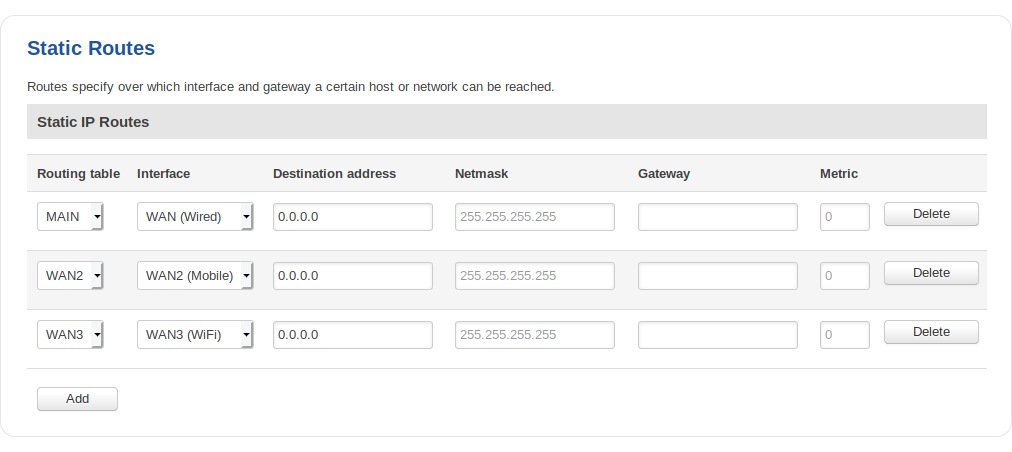RUT850 Routing: Difference between revisions
No edit summary |
|||
| Line 19: | Line 19: | ||
<tr> | <tr> | ||
<td>Routing table</td> | <td>Routing table</td> | ||
<td>Main | <td>Main | WAN | WAN2 | WAN3; Default: '''WAN'''</td> | ||
<td>Defines which table will be used for the route in question</td> | <td>Defines which table will be used for the route in question</td> | ||
</tr> | </tr> | ||
<tr> | <tr> | ||
<td>Interface</td> | <td>Interface</td> | ||
<td>LAN | <td>LAN | WAN(wired) | WAN2(Mobile) | WAN3(WiFi) | VPN instances; Default: '''WAN(wired)'''</td> | ||
<td>The zone where the target network resides</td> | <td>The zone where the target network resides</td> | ||
</tr> | </tr> | ||
| Line 84: | Line 84: | ||
</tr> | </tr> | ||
</table> | </table> | ||
[[Category:RUT850 WebUI]] | |||
Revision as of 07:54, 1 March 2019
Main Page > EOL Products > RUT850 > RUT850 Manual > RUT850 WebUI > RUT850 Network section > RUT850 RoutingSummary
This chapter is an overview of the Routing section in RUT devices.
Static Routes
Static routes specify over which interface and gateway a certain host or network can be reached. In this page you can configure your own custom routes.
| field name | value | description |
|---|---|---|
| Routing table | Main | WAN | WAN2 | WAN3; Default: WAN | Defines which table will be used for the route in question |
| Interface | LAN | WAN(wired) | WAN2(Mobile) | WAN3(WiFi) | VPN instances; Default: WAN(wired) | The zone where the target network resides |
| Destination address* | ip; Default: 0.0.0.0 | The address of the destination network |
| Netmask* | ip; Default: 0.0.0.0 | A Mask that is applied to the Target to determine to what actual IP addresses the routing rule applies |
| Gateway | ip; Default: " " | Defines where the router should send all the traffic that applies to the rule |
| Metric | integer; Default: 0 | The Metric value is used as a sorting measure. If a packet about to be routed fits two rules, the one with the higher metric is applied |
*Additional notes on Destination & Netmask:
You can define a rule that applies to a single IP like this: Destination - some IP; Netmask - 255.255.255.255. Furthermore, you can define a rule that applies to a segment of IPs like this: Destination – some IP that STARTS some segment; Netmask – Netmask that defines how large the segment is. e.g.:
| field name | value | description |
|---|---|---|
| 192.168.55.161 | 255.255.255.255 | Only applies to 192.168.55.161 |
| 192.168.55.0 | 255.255.255.240 | Applies to IPs in the 192.168.55.0 - 192.168.55.255 |
| 192.168.55.240 | 255.255.255.240 | 192.168.55.240 - 192.168.55.255 |
| 192.168.55.161 | 255.255.255.0 | 192.168.55.0 - 192.168.55.255 |
| 192.168.0.0 | 255.255.0.0 | 192.168.0.0 - 192.168.255.255 |

